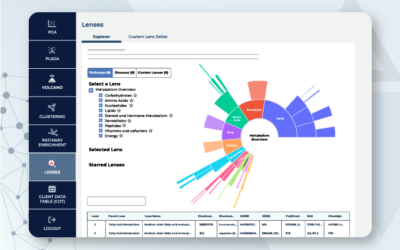Alpha-diversity in the gut microbiome holds many clues to understanding human health. Now those clues are more accessible because Institute for Systems Biology (ISB) researchers can predict the diversity of an individual’s gut microbiome by examining metabolites in the blood.
By analyzing the de-identified multi-omic data from several hundred consenting participants in a consumer scientific wellness program, researchers found that they can predict the health-associated alpha diversity of the gut microbiome by using a model trained on 40 circulating blood metabolites. Additionally, they can classify people with low gut diversity as being potentially susceptible to diseases like Clostridium difficile (C. diff) by using an 11-metabolite model.
Metabolomics was a key tool that researchers used throughout their work. Other technologies are used frequently to associate the strains of bacteria present in a microbiome sample with disease, however determining the causal relationship can be a daunting challenge. Metabolomics offers unique insight to determine mechanism by revealing metabolites at the apex of function that can then be directly tested to establish causation. Compared to genomics, which primarily provides information about a biochemical’s potential, metabolomics helps us understand the function.

Here are 3 insights that metabolomics helped the ISB researchers uncover:
1. The Gut Microbiome is Reflected in the Blood Stream
Dr. Sean Gibbons, assistant professor at ISB and a co-corresponding author on the paper, observed an intimate connection between what’s happening metabolically in the gut and the blood. This allowed scientists to measure the compositional structure of the microbes in the gut by looking in the blood. “It points more and more to the idea that the gut microbiome is an endocrine organ,” he said. “Just like the liver produces metabolites that are circulating around our bodies, so too does the microbiome. It’s another drop in the bucket for why the microbiome is important to understand the health and wellness of our bodies.”
Metabolomics was important to this insight because it revealed a conversation we otherwise would have missed. According to Dr. Gibbons, “Living in a microscopic world, cells communicate with each other by speaking in small molecules. We’re seeing a conversation happen between the microbiome and body, and metabolomics allows us to listen to the language spoken by the microbiome to the body.”
Metabolomics can provide a powerful view of the circulating microbiota-derived metabolites in the blood. These metabolites produced by the bacteria can profoundly influence the physiology of the host. If you ignore the details in the blood, you may be missing crucial information like the connections of the gut-brain axis.
2. Understanding “Ideal” Levels of Diversity
ISB’s research suggests there is a “Goldilocks zone” for gut diversity where decreased diversity correlates with symptoms of diarrhea and inflammation, while elevated diversity is associated with constipation and potentially harmful protein fermentation metabolites.
Historically, the assumption was the more diversity the better; but Dr. Gibbons cautions that alpha diversity is more complicated than we initially thought. This realization suggests that there is an optimal “just right” zone of gut microbiome diversity.
Metabolomics was a key resource here as well, as it allowed the researchers to see that protein fermentation products were building up in the bloodstream of people with high alpha diversity who suffered from constipation. Generally speaking, the largest energy input to the microbiome is usually fiber. If the microbiome ferments all the available fiber, it will start to starve and switch the metabolism to fermenting protein. The fermentation of proteins by the gut microbiome may be associated with bad health outcomes such as cancer and heart disease. ISB researchers were able to use metabolomics to identify that protein fermentation was happening in some study participants with high alpha diversity.
3. BMI Changes Norms
Researchers observed that their model didn’t hold true for parts of the population, so they stratified for body mass index (BMI). They found that anyone with a BMI of 35 and above — indicating significant obesity — was not predicted well by this model, suggesting a key interaction of obesity and the gut microbiome.
Dr. Gibbons said that by using metabolomics, “we were able to see the metabolic relationship between the gut microbiome and blood, and we saw that relationship break down in people with high obesity. In that group there was a different set of metabolites associated with the microbiome, which points to a different kind of conversation going on between the molecules produced by the microbiota and the molecules circulating in the bloodstream.”
Thanks to the ISB team and metabolomics, many new research doors have been opened, including the potential to develop a simple, clinical blood test to measure alpha diversity in the gut.
Is metabolomics at the center of your research? If not you risk missing out on key insights. To learn more, download the infographic 5 Risks Researchers Take by Not Prioritizing Metabolomics in Microbiome Research or contact us.






